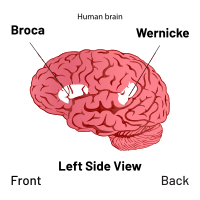- For a topical guide of this subject, see Outline of linguistics
Welcome to the Linguistics Portal!Linguistics is the scientific study of language. Linguistics is based on a theoretical as well as a descriptive study of language and is also interlinked with the applied fields of language studies and language learning, which entails the study of specific languages. Before the 20th century, linguistics evolved in conjunction with literary study and did not employ scientific methods. Modern-day linguistics is considered a science because it entails a comprehensive, systematic, objective, and precise analysis of all aspects of language – i.e., the cognitive, the social, the cultural, the psychological, the environmental, the biological, the literary, the grammatical, the paleographical, and the structural. Traditional areas of linguistic analysis correspond to syntax (rules governing the structure of sentences), semantics (meaning), morphology (structure of words), phonetics (speech sounds and equivalent gestures in sign languages), phonology (the abstract sound system of a particular language), and pragmatics (how social context contributes to meaning). Subdisciplines such as biolinguistics (the study of the biological variables and evolution of language) and psycholinguistics (the study of psychological factors in human language) bridge many of these divisions. Linguistics encompasses many branches and subfields that span both theoretical and practical applications. Theoretical linguistics (including traditional descriptive linguistics) is concerned with understanding the universal and fundamental nature of language and developing a general theoretical framework for describing it. Applied linguistics seeks to utilise the scientific findings of the study of language for practical purposes, such as developing methods of improving language education and literacy. Linguistic features may be studied through a variety of perspectives: synchronically (by describing the structure of a language at a specific point in time) or diachronically (through the historical development of a language over a period of time), in monolinguals or in multilinguals, among children or amongst adults, in terms of how it is being learnt or how it was acquired, as abstract objects or as cognitive structures, through written texts or through oral elicitation, and finally through mechanical data collection or through practical fieldwork. (Full article...) Selected article -The word thou was a second person singular pronoun in English. It is now largely archaic, having been replaced in almost all contexts by "you". Thou is the nominative form; the oblique/objective form is thee (functioning as both accusative and dative), and the possessive is thy or thine. Originally, thou was simply the singular counterpart to the plural pronoun ye, derived from an ancient Indo-European root. In imitation of continental practice, thou was later used to express intimacy, familiarity, or even disrespect while another pronoun, you, the oblique/objective form of ye, was used for formal circumstances (see T–V distinction). After thou fell out of fashion, it was primarily retained in fixed ritual settings, so that for some speakers, it came to connote solemnity or even formality. Thou persists, sometimes in altered form, in regional dialects of England and Scotland. The disappearance of the singular-plural distinction has been compensated for through the use of neologisms in various dialects. Colloquial American English, for example, contains plural constructions that vary regionally, including y'all, youse, and you guys. (more...) Did you know...From Wikipedia's "Did You Know" archives: 
Related PortalsThings you can do
WikiProjectsThe following WikiProjects work to improve topics concerned with linguistics:
Associated WikimediaThe following Wikimedia Foundation sister projects provide more on this subject:
Discover Wikipedia using portals |



























